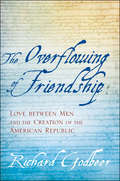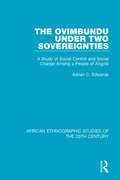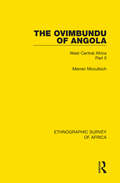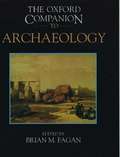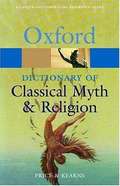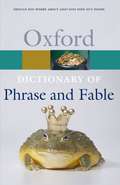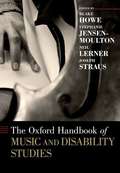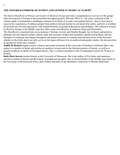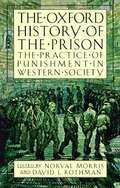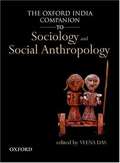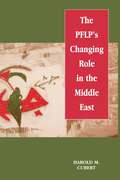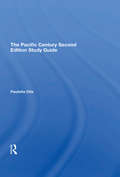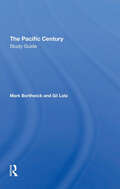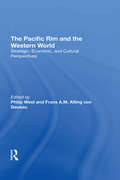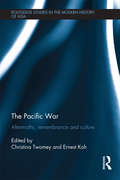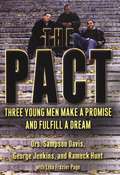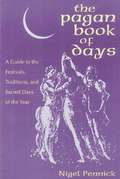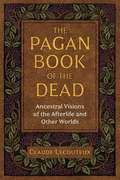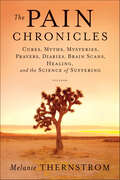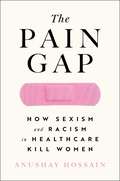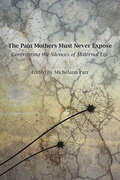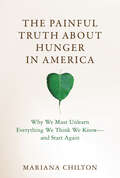- Table View
- List View
The Overflowing of Friendship: Love between Men and the Creation of the American Republic
by Richard GodbeerWhen eighteenth-century American men described "with a swelling of the heart" their friendships with other men, addressing them as "lovely boy" and "dearly beloved," celebrating the "ardent affection" that knit their hearts in "indissoluble bonds of fraternal love," their families, neighbors, and acquaintances would have been neither surprised nor disturbed. Richard Godbeer’s groundbreaking new book examines loving and sentimental friendships among men in the colonial and revolutionary periods. Inspired in part by the eighteenth-century culture of sensibility and in part by religious models, these relationships were not only important to the personal happiness of those involved but also had broader social, religious, and political significance. Godbeer shows that in the aftermath of Independence, patriots drafted a central place for male friendship in their social and political blueprint for the new republic. American revolutionaries stressed the importance of the family in the era of self-government, reimagining it in ways appropriate to a new and democratized era. They thus shifted attention away from patriarchal authority to a more egalitarian model of brotherly collaboration. In striving to explore the inner emotional lives of early Americans, Godbeer succeeds in presenting an entirely fresh perspective on the personal relationships and political structures of the period.Scholars have long recognized the importance of same-sex friendships among women, but this is the first book to examine the broad significance ascribed to loving friendships among men during this formative period of American history. Using an array of personal and public writings, The Overflowing of Friendship will transform our understanding of early American manhood as well as challenge us to reconsider the ways we think about gender in this period.
The Ovimbundu Under Two Sovereignties: A Study of Social Control and Social Change Among a People of Angola
by Adrian C. EdwardsOriginally published in 1962, this study discusses the changes in the life of the Ovimbundu from the time of their caravan trade in slaves, rubber, and ivory down to the more recent period when the organization of their chiefdoms was influenced by the Catholic missions, Portuguese administration and wage labour.
The Ovimbundu of Angola: West Central Africa Part II
by Merran MccullochRoutledge is proud to be re-issuing this landmark series in association with the International African Institute. The series, published between 1950 and 1977, brings together a wealth of previously un-co-ordinated material on the ethnic groupings and social conditions of African peoples. Concise, critical and (for its time) accurate, the Ethnographic Survey contains sections as follows: Physical Environment Linguistic Data Demography History & Traditions of Origin Nomenclature Grouping Cultural Features: Religion, Witchcraft, Birth, Initiation, Burial Social & Political Organization: Kinship, Marriage, Inheritance, Slavery, Land Tenure, Warfare & Justice Economy & Trade Domestic Architecture Each of the 50 volumes will be available to buy individually, and these are organized into regional sub-groups: East Central Africa, North-Eastern Africa, Southern Africa, West Central Africa, Western Africa, and Central Africa Belgian Congo. The volumes are supplemented with maps, available to view on routledge.com or available as a pdf from the publishers.
The Oxford Book of Letters
by Frank Kermode Anita KermodeA collection of well-known letters written over the centuries.
The Oxford Companion to Archaeology
by Brian M. FaganThe Companion is a book of contemporary science with strong roots in the humanities and social sciences, written by active scholars with broad experience in the field and the laboratory. They present the latest advances and discoveries in archaeology.
The Oxford Dictionary of Classical Myth and Religion
by Simon Price Emily KearnsDrawn from the acclaimed Oxford Classical Dictionary, The Oxford Dictionary of Classical Myth and Religion offers a fully rounded guide to all aspects of religious life and thought in ancient Greece and Rome. Highly authoritative, this new book covers not only Greek mythologies and Roman festivals, but also devotes attention to topics such as Greek and Roman religious places, monuments, authors and texts, religious organization, imagery, divination, astrology, and magic. Unlike many other references on ancient Greece and Rome, the Dictionary also includes many entries on Judaism and Christianity in the classical world. The editors, area advisors for the third edition of the Oxford Classical Dictionary, have selected, revised, edited, and in some instances completely recast a large number of entries from the OCD to create this handy and accessible reference. The main text is supplemented by an important introductory essay providing overviews of mythology, religious pluralism in the ancient world, and the reception of myths from antiquity to the present. In addition to a helpful thematic index and extensive cross-references, the text is further supported by three maps and six genealogies. Backed by the authority and scholarly rigor of the renowned Oxford Classical Dictionary, The Oxford Dictionary of Classical Myth and Religion is a valuable A-Z reference and is as ideal a tool for students and teachers of ancient history as it is for all classics lovers.
The Oxford Dictionary of Phrase and Fable (2nd edition)
by Elizabeth KnowlesRevised and enlarged from the 2000 first edition, the dictionary cites words, phrases, and names with cultural resonance, to allow readers to understand and sometimes decode phrases they run across or perhaps have heard for years without ever quite understanding the connotation. The emphasis is on the allusion or reference, though origins of the phrase are also often explained. New here are such terms as nine-eleven (9-11, 9/11), axis of evil, and coalition of the willing. The cross-referencing is extensive. Annotation ©2006 Book News, Inc., Portland, OR (booknews.com)
The Oxford Guide to Arthurian Literature and Legend
by Alan LupackThe Oxford Guide to Arthurian Literature and Legend is both a critical history of the Arthurian tradition and a reference guide to Arthurian works, names, and symbols. It offers a comprehensive survey of the legends in all of their manifestations, from their origins in medieval literature to their adaptation in modern literature, arts, film, and popular culture. Not only does it analyse familiar Arthurian characters and themes, it also demonstrates the tremendous continuity of the legends by examining the ways that they have been reinterpreted over the years. For instance, the motif of the abduction of Guinevere can be traced from Chretien de Troyes's Lancelot or the Knight of the Cart and the vulgate cycle of French romances in the 13th century, to Malory's retelling of the story in the Morte d'Arthur, through various modern adaptations like those in T. H. White's The Once and Future King and the contemporary film First Knight. This indispensable reference guide contains seven essays that trace the development of the Arthurian legend, encyclopedic entries, bibliographies, and a comprehensive index. The essays explore the chronicle and romance traditions, the influence of Malory, the Grail legend, the figures of Gawain and Merlin, and the story of Tristan and Isolt. The entries, which highlight key Arthurian characters, symbols, and places, offer quick and easy references. The extensive chapter-by-chapter bibliographies, which are subdivided by topic, augment the general bibliography of Arthurian resources. Comprehensive in its analysis and hypertextual in its approach, The Oxford Guide to Arthurian Literature and Legend is an essential reference book for Arthurian scholars, medievalists, and for those interested in cultural studies of myth and legend.
The Oxford Handbook of Music and Disability Studies
by Joseph Straus Blake Howe Stephanie Jensen-Moulton Neil LernerThe Oxford Handbook of Music and Disability Studies represents a comprehensive state of current research for the field of Disability Studies and Music. The forty-two chapters in the book span a wide chronological and geographical range, from the biblical, the medieval, and the Elizabethan,through the canonical classics of the eighteenth and nineteenth centuries, up to modernist styles and contemporary musical theater and popular genres, with stops along the way in post-Civil War America, Ghana and the South Pacific, and many other interesting times and places. Disability is a broad, heterogeneous, and porous identity, and that diversity is reflected in the variety of bodily conditions under discussion here, including autism and intellectual disability, deafness, blindness, mobility impairment often coupled with bodily difference, and cognitive and intellectual impairments. Amid this diversity of time, place, style, medium, and topic, the chapters share two core commitments. First, they are united in their theoretical and methodological connection to Disability Studies, especially its central idea that disability is a social and cultural construction. Disability both shapes and is shaped by culture, including musical culture. Second, these essays individually and collectively make the case that disability is not something at the periphery of culture and music, but something central to our art and to our humanity.
The Oxford Handbook of Women and Gender in Medieval Europe
by Judith M. Bennett Ruth Mazo KarrasThe Oxford Handbook of Women and Gender in Medieval Europe provides a comprehensive overview of the gender rules encountered in Europe in the period between approximately 500 and 1500 C.E. <p><P>The essays collected in this volume speak to interpretative challenges common to all fields of women's and gender history—that is, how best to uncover the experiences of ordinary people from archives formed mainly by and about elite males, and how to combine social histories of lived experiences with cultural histories of gendered discourses and identities. The collection focuses on Western Europe in the Middle Ages but offers some consideration of medieval Islam and Byzantium.
The Oxford History of the Prison: The Practice of Punishment in Western Society
by Norval Morris David J. RothmanThe history of prisons is marked with extraordinary changes. Before the 18th century, prison was not the essential part of punishment.
The Oxford India Companion to Sociology and Social Anthropology
by Veena DasWith fascinating entries on sociological and social anthropological research in India, this volume presents a wealth of information, including developments in the field, important empirical work, and its contributions to sociology as a whole.
The PFLP's Changing Role in the Middle East
by Harold M. CubertThis is a history of the Popular Front for the Liberation of Palestine (PFLP), a violent Marxist faction within the Palestinian national movement. Cubert explores the group's background and provides an analysis of its aims, methods, structures and the factors responsible for its decline.
The Pacific Century Second Edition Study Guide
by Pauletta OtisThis book provides basic information and analysis concerning how the forces of change during the Pacific Century will provide a base for the future of the Pacific Asia. It presents a general chronological development of the civilizations and empires in the Pacific Asia.
The Pacific Century Study Guide
by Mark Borthwick Gil LatzPoised to enter the twenty-first century, the Asia-Pacific region has emerged as a global economic and political powerhouse. Mark Borthwicks Pacific Century: The Emergence of Modern Pacific Asia stresses broad, cross-cutting themes of regional history, with an emphasis on the interactions between cultures and nations. This study guide is an indispensable volume that provides a comprehensive overview, chapter-by-chapter outlines, definitions of key terms, identification of key people, places, and events, and a list of books for additional reading.
The Pacific Circuit: A Globalized Account of the Battle for the Soul of an American City
by Alexis MadrigalAlexis Madrigal reveals how understanding Oakland explains the modern world. In The Pacific Circuit, the award-winning journalist Alexis Madrigal sculpts an intricate tableau of the city of Oakland that is at once a groundbreaking big-idea book, a deeply researched work of social and political history, and an intimate portrait of an essential American city that has been at the crossroads of the defining themes of the twenty-first century. Oakland’s stories encompass everything from Silicon Valley’s prominence and the ramifications of a compulsively digital future to the underestimated costs of technological innovation on local communities—all personified in this changing landscape for the city’s lifelong inhabitants. The Pacific Circuit holds a magnifying glass to the scars etched by generations of systemic segregation and the ceaseless march of technological advancement. These are not just abstract concepts; they are embedded in the very fabric of Oakland and its people, from dockworkers and community organizers to real estate developers and businesspeople chasing the highest possible profits. Madrigal delves into city hall politics, traces the intertwining arcs of venture capital and hedge funds, and offers unprecedented insight into Silicon Valley’s genesis and growth, all against the backdrop of Oakland—a city vibrating with untold stories and unexplored connections that can, when read carefully, reveal exactly how our markets and our world really function.
The Pacific Rim And The Western World: Strategic, Economic, And Cultural Perspectives
by Philip West Frans A.M. Von GeusauAnalyzing the economic, strategic, and cultural elements that shape the attraction--and the friction--between the Pacific and Atlantic communities, this book integrates European perspectives into a discussion that has traditionally been dominated by Asian and U.S. voices. The authors take as their theme the uncertainty created by the Pacific Rim’s new role in shifting the international balances of political and economic power. Economic uncertainty has been fueled by Asia’s trade surpluses with Western Europe and the United States, with the West viewing its system of free world trade as working to the greater advantage of the Asia Pacific. Strategic uncertainty pivots on the U.S.-USSR superpower rivalry and on the growing influence of Japan and the PRC on the strategic balance in the Pacific Basin. A more subtle and powerful constraint surfaces in the realm of culture--in differing perceptions among the people of the Asia Pacific and the West concerning liberal values and the liberal underpinnings of the present system of world trade.
The Pacific War: Aftermaths, Remembrance and Culture (Routledge Studies in the Modern History of Asia)
by Ernest Koh Christina TwomeyThe Pacific War is an umbrella term that refers collectively to a disparate set of wars, however, this book presents a strong case for considering this assemblage of conflicts as a collective, singular war. It highlights the genuine thematic commonalities in the legacies of war that cohere across the Asia-Pacific and shows how the wars, both individually and collectively, wrought dramatic change to the geo-political makeup of the region. This book discusses the cultural, political and social implications of the Pacific War and engages with debates over the war’s impact, legacies, and continuing cultural resonances. Crucially, it examines the meanings and significance of the Second World War from a truly international perspective and the contributors present fascinating case studies that highlight the myriad of localised idiosyncrasies in how the Pacific War has been remembered and deployed in political contexts. The chapters trace the shared legacy that the individual wars had on demographics, culture and mobility across the Asia Pacific, and demonstrate how in the aftermath of the war political borders were transformed and new nation states emerged. The book also considers racial and sexual tensions which accompanied the arrival of both Allied and Axis personnel and their long lasting consequences, as well as the impact returning veterans and the war crime trials that followed the conflict had on societies in the region. In doing so, it succeeds in illuminating the events and issues that unfolded in the weeks, months, and indeed decades after the war. This interdisciplinary volume examines the aftermaths and legacies of war for individuals, communities, and institutions across South, Southeast, and East Asia, Oceania, and the Pacific world. As such, it will be welcomed by students and scholars of Asian history, modern history and cultural history, as well as by those interested in issues of memory and commemoration.
The Pact
by Sampson Davis George Jenkins Rameck HuntThis story is told by the three young men who make a pact. This pact keeps them on track to fulfill their dreams.
The Pagan Book of Days: A Guide to the Festivals, Traditions and Sacred Days of the Year
by Nigel PennickThe Pagan Tradition is grounded in mystical and numinous elements existing between matter and spirit. The world over it is called something like "the old religion," or "the elder faith," acknowledging its senior status among religions. It places emphasis on the links between people, their land, and the natural cycles of the seasons.
The Pagan Book of the Dead: Ancestral Visions of the Afterlife and Other Worlds
by Claude LecouteuxAn extensive look at the cartography and folklore of the afterlife worlds as seen by our ancestors • Examines how ancient European cultures viewed the beyond, including the Blessed Isles of early Greek and Celtic faith, the Hebrew Sheol, Hades from Homer&’s Odyssey, Hel and Valhalla of the Norse, and the Aralu of Babylon • Shows how medieval accounts of journeys into the Other World represent the first recorded near-death experiences • Connects medieval afterlife beliefs and NDE narratives with shamanism, looking in particular at psychopomps, power animals, the double, the fetch, and what people bring back from their journeys to the spirit realms Charting the evolution of afterlife beliefs in both pagan and medieval Christian times, Claude Lecouteux offers an extensive look at the cartography and folklore of the afterlife worlds as seen by our ancestors. Exploring the locations and topographies of the various forms taken by Hell, Purgatory, and Heaven, he examines how ancient European cultures viewed the beyond, including the Blessed Isles of early Greek and Celtic faith, the Hebrew Sheol, the pale world of Hades from Homer&’s Odyssey, Hel and Valhalla of the Norse, and the Aralu of Babylon, the land where nothing can be seen. The author also explores beliefs in Other Worlds, lands different from our own that are not the afterlife but places where time flows differently and which are inhabited by fantastic or supernatural beings such as fairies or dwarfs. Sharing medieval tales of journeys into the beyond, Lecouteux shows how these accounts represent the first recorded near-death experiences (NDEs) and examines how they compare with modern NDE narratives as well as the work of NDE researchers like Raymond Moody. In addition, he also explores tales of out-of-body experiences, dream journeys, and travels made by a double or fetch and connects these narratives with shamanism, looking in particular at psychopomps, power animals, and what people bring back from their journeys to the spirit realms. Analyzing the afterlife beliefs of the Middle Ages as a whole, Lecouteux concludes with a collection of medieval afterlife-related traditions, such as placing polished stones in the coffin so the departed soul can find its way back to friends and family at those times of the year when the veil between the worlds grows thin.
The Pain Chronicles: Cures, Myths, Mysteries, Prayers, Diaries, Brain Scans, Healing, and the Science of Suffering
by Melanie ThernstromEach of us will know physical pain in our lives, but none of us knows when it will come or how long it will stay. Today as much as 10 percent of the population of the United States suffers from chronic pain. It is more widespread, misdiagnosed, and undertreated than any major disease. While recent research has shown that pain produces pathological changes to the brain and spinal cord, many doctors and patients still labor under misguided cultural notions and outdated scientific dogmas that prevent proper treatment, to devastating effect.In The Pain Chronicles, a singular and deeply humane work, Melanie Thernstrom traces conceptions of pain throughout the ages—from ancient Babylonian pain-banishing spells to modern brain imaging—to reveal the elusive, mysterious nature of pain itself. Interweaving first-person reflections on her own battle with chronic pain, incisive reportage from leading-edge pain clinics and medical research, and insights from a wide range of disciplines—science, history, religion, philosophy, anthropology, literature, and art—Thernstrom shows that when dealing with pain we are neither as advanced as we imagine nor as helpless as we may fear.Both a personal meditation and an intellectual exploration, The Pain Chronicles illuminates and makes sense of the all-too-human experience of pain—and confronts with extraordinary grace and empathy its peculiar traits, its harrowing effects, and its various antidotes.
The Pain Gap: How Sexism and Racism in Healthcare Kill Women
by Anushay HossainExplore real women&’s tales of healthcare trauma and medical misogyny with this meticulously researched, in-depth examination of the women&’s health crisis in America—and what we can do about it.When Anushay Hossain became pregnant in the US, she was so relieved. Growing up in Bangladesh in the 1980s, where the concept of women&’s healthcare hardly existed, she understood how lucky she was to access the best in the world. But she couldn&’t have been more wrong. Things started to go awry from the minute she stepped in the hospital, and after thirty hours of labor (two of which she spent pushing), Hossain&’s epidural slipped. Her pain was so severe that she ran a fever of 104 degrees, and as she shook and trembled uncontrollably, the doctors finally performed an emergency C-section. Giving birth in the richest country on earth, Hossain never imagined she could die in labor. But she almost did. The experience put her on a journey to explore, understand, and share how women—especially women of color—are dismissed to death by systemic sexism in American healthcare. Following in the footsteps of feminist manifestos such as The Feminine Mystique and Rage Becomes Her, The Pain Gap is an eye-opening and stirring call to arms that encourages women to flip their &“hysteria complex&” on its head and use it to revolutionize women&’s healthcare. This book tells the story of Hossain&’s experiences—from growing up in South Asia surrounded by staggering maternal mortality rates to lobbying for global health legislation on Capitol Hill to nearly becoming a statistic herself. Along the way, she realized that a little fury might be just what the doctor ordered. Meticulously researched and deeply reported, this book explores real women&’s traumatic experiences with America&’s healthcare system—and empowers everyone to use their experiences to bring about the healthcare revolution women need.
The Pain Mothers Must Never Expose: Confronting the Silences of Maternal Life
by Michelann ParrIn this collection, contributors reject the narrative that suggests that the pain of mothers must never be exposed. They allow their pain to wander outside the frame of the requisite pathos; individual pieces reveal pain to be a complex and intersectional practice that encompasses denial and disenfranchisement where pain is birthed and named; disorientation leading to a search for stable ground; destabilization that inspires non-normative mothering; and discovery as an active stance that transforms intergenerational pain. As contributors take up the challenge of unravelling their stories, they reach for a life-sustaining and hopeful shift in consciousness that allows them to listen to what pain has to offer without judgment; to imagine and create a different future for themselves, their children, and the world; and to let go of maternal pain and suffering as a way of being. Readers will be inspired by raw honesty, authenticity, and willingness to embrace story as a gift to self.
The Painful Truth about Hunger in America: Why We Must Unlearn Everything We Think We Know--and Start Again (Food, Health, and the Environment)
by Mariana ChiltonA radical and urgent new approach to how we can solve the problems of hunger and poverty in the US.Most people think hunger has to do with food: researchers, policymakers, and advocates focus on promoting government-funded nutrition assistance; well-meaning organizations try to get expired or wasted food to marginalized communities; and philanthropists donate their money to the cause and congratulate themselves for doing so. But few people ask about the structural issues undergirding hunger, such as, Who benefits from keeping people in such a state of precarity? In The Painful Truth about Hunger in America, Mariana Chilton shows that the solution to food insecurity lies far beyond food and must incorporate personal, political, and spiritual approaches if we are serious about fixing the crisis.Drawing on 25 years of research, programming, and advocacy efforts, Chilton compellingly demonstrates that food insecurity is created and maintained by people in power. Taking the reader back to the original wounds in the United States caused by its history of colonization, genocide, and enslavement, she forces us to reckon with hard questions about why people in the US allow hunger to persist. Drawing on intimate interviews she conducted with many Black and Brown women, the author reveals that the experience of hunger is rooted in trauma and gender-based violence—violence in our relationships with one another, with the natural world, and with ourselves—and that if we want to fix hunger, we must transform our society through compassion, love, and connection. Especially relevant for young people charting new paths toward abolition, mutual aid, and meaningful livelihoods, The Painful Truth about Hunger in America reinvigorates our commitment to uprooting the causes of poverty and discrimination, and points to a more generative and humane world where everyone can be nourished.
